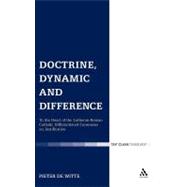
Note: Supplemental materials are not guaranteed with Rental or Used book purchases.
Purchase Benefits
Looking to rent a book? Rent Doctrine, Dynamic and Difference To the Heart of the Lutheran-Roman Catholic Differentiated Consensus on Justification [ISBN: 9780567236654] for the semester, quarter, and short term or search our site for other textbooks by De Witte, Pieter. Renting a textbook can save you up to 90% from the cost of buying.
| Acknowledgements | p. xii |
| Abbreviations | p. xiv |
| Introduction | p. 1 |
| The Joint Declaration on Justification and the Problem of Difference | p. 5 |
| Introduction | p. 5 |
| The Absence of a Fundamental Difference in the JDDJ | p. 6 |
| An Ambiguity | p. 13 |
| The First Issue: The Location of the Fundamental Difference | p. 19 |
| The Second Issue: Theological Concerns and Ecclesial Doctrines | p. 24 |
| Summary | p. 33 |
| Reception of Theological Advances | p. 35 |
| Introduction | p. 35 |
| Otto Hermann Pesch and the Ambiguities of Difference | p. 36 |
| Introduction | p. 36 |
| Mutual Challenges | p. 38 |
| Existential and Sapiential Theology | p. 44 |
| Comprehensive Models of Thought | p. 51 |
| The Basis of the Paradoxes of Difference | p. 58 |
| The Finnish School of Luther Interpretation and the Justification Debate | p. 60 |
| The Finnish School of Luther Interpretation: General Characteristics | p. 61 |
| The Finnish School and the Lutheran-Roman Catholic Debate on Justification | p. 63 |
| Forensic and Effective Justification | p. 64 |
| Simul iustus et peccator | p. 67 |
| Confrontation with a Renewed Roman Catholic Approach to Justification | p. 71 |
| The Fundamental Theological Problem of Relation and Ontology | p. 78 |
| Some Concluding Reflections | p. 83 |
| Summary | p. 95 |
| The Reception of Previous Dialogue Results | p. 99 |
| Introduction | p. 99 |
| Diversity and Ecumenical Strategies | p. 101 |
| Exegesis, History and the Challenge of Doctrinal Difference | p. 102 |
| Fears, Concerns and Patterns of Thought | p. 105 |
| Affirming the Consensus | p. 110 |
| Existential and Sapiential Theology Revisited | p. 119 |
| Freedom and Salvation (JBF) | p. 120 |
| An 'Existential' Common Ground and 'Sapiential' Differences (LK) | p. 123 |
| Different Implications of Recognizing the Consensus | p. 133 |
| The Problem of Doctrine | p. 137 |
| Doctrine and the Reality of Faith | p. 137 |
| Primary and Secondary Criteria | p. 142 |
| Ecclesiological Ramifications | p. 144 |
| The German Dialogue and the Problem of Reception | p. 147 |
| Summary | p. 154 |
| The Joint Declaration on the Doctrine of Justification: Analysis | p. 157 |
| A Brief History of the JDDJ | p. 157 |
| Characteristics of the JDDJ as an Official Reception of Previous Dialogues | p. 164 |
| The Content of the JDDJ | p. 169 |
| Sin and Human Powerlessness | p. 169 |
| Justification as Forgiveness of Sins and Making Righteous | p. 175 |
| The Theme in Relation to Human Cooperation | p. 175 |
| A Lutheran Tension | p. 180 |
| Faith and Grace | p. 183 |
| Trust, Hope and Love | p. 183 |
| Justification as Communion | p. 186 |
| Faith Alone - or Trust Alone? | p. 190 |
| The Sinfulness of the Justified | p. 194 |
| Sinfulness, Renewal and Baptism | p. 194 |
| Tendencies in the Separate Paragraphs | p. 195 |
| A Structural Change in the Lutheran Paragraph | p. 197 |
| The Vatican Response | p. 200 |
| Law and Gospel | p. 202 |
| Faith as Assurance of Salvation | p. 206 |
| Faith and Good Works | p. 210 |
| onclusion | p. 219 |
| The JDDJ and the Fundamental Difference | p. 219 |
| Doctrinal Demarcation | p. 222 |
| The Assessment | p. 225 |
| Justification as Criterion and the Church | p. 232 |
| Bibliography | p. 241 |
| Index | p. 251 |
| Table of Contents provided by Ingram. All Rights Reserved. |
The New copy of this book will include any supplemental materials advertised. Please check the title of the book to determine if it should include any access cards, study guides, lab manuals, CDs, etc.
The Used, Rental and eBook copies of this book are not guaranteed to include any supplemental materials. Typically, only the book itself is included. This is true even if the title states it includes any access cards, study guides, lab manuals, CDs, etc.